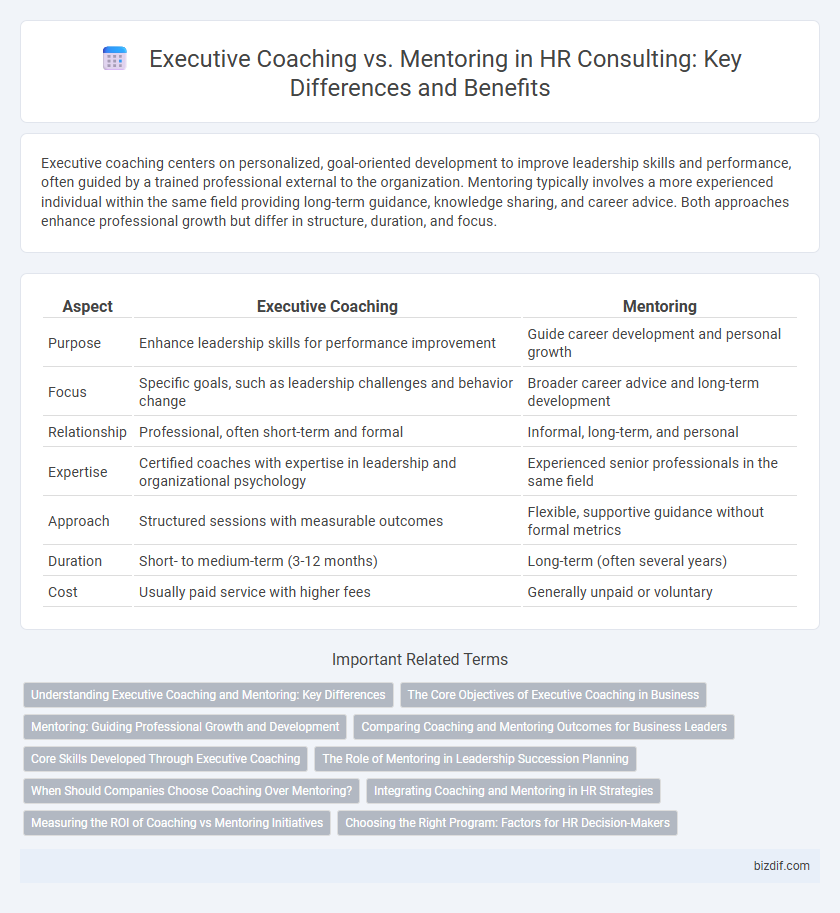Executive coaching centers on personalized, goal-oriented development to improve leadership skills and performance, often guided by a trained professional external to the organization. Mentoring typically involves a more experienced individual within the same field providing long-term guidance, knowledge sharing, and career advice. Both approaches enhance professional growth but differ in structure, duration, and focus.
Table of Comparison
| Aspect | Executive Coaching | Mentoring |
|---|---|---|
| Purpose | Enhance leadership skills for performance improvement | Guide career development and personal growth |
| Focus | Specific goals, such as leadership challenges and behavior change | Broader career advice and long-term development |
| Relationship | Professional, often short-term and formal | Informal, long-term, and personal |
| Expertise | Certified coaches with expertise in leadership and organizational psychology | Experienced senior professionals in the same field |
| Approach | Structured sessions with measurable outcomes | Flexible, supportive guidance without formal metrics |
| Duration | Short- to medium-term (3-12 months) | Long-term (often several years) |
| Cost | Usually paid service with higher fees | Generally unpaid or voluntary |
Understanding Executive Coaching and Mentoring: Key Differences
Executive coaching involves a structured, outcomes-driven process focused on enhancing leadership skills and organizational performance through personalized guidance from professional coaches. Mentoring emphasizes long-term professional development by fostering a supportive relationship where experienced mentors share knowledge, insights, and career advice with mentees. Understanding these distinctions helps organizations tailor talent development strategies that align with specific leadership goals and growth phases.
The Core Objectives of Executive Coaching in Business
Executive coaching in business centers on enhancing leadership skills, improving decision-making, and driving organizational performance through personalized guidance. It targets executive competencies such as strategic thinking, emotional intelligence, and effective communication to align personal growth with corporate goals. Unlike mentoring, executive coaching uses structured feedback and goal-oriented sessions to accelerate leadership development and business impact.
Mentoring: Guiding Professional Growth and Development
Mentoring in HR consulting plays a crucial role in guiding professional growth by providing personalized advice, support, and knowledge transfer from experienced professionals to mentees. This process fosters long-term career development, enhances leadership skills, and builds confidence through continuous feedback and relationship building. Effective mentoring programs create a structured path for skill enhancement, cultural integration, and organizational alignment within executive teams.
Comparing Coaching and Mentoring Outcomes for Business Leaders
Executive coaching typically delivers measurable improvements in leadership effectiveness, decision-making, and strategic thinking, directly influencing business outcomes such as team performance and revenue growth. Mentoring, while fostering long-term professional development and organizational knowledge transfer, often emphasizes personal growth and career guidance, supporting sustained leadership success. Business leaders benefit from coaching's targeted skill enhancement combined with mentoring's holistic career support to achieve comprehensive leadership development.
Core Skills Developed Through Executive Coaching
Executive coaching in HR consulting primarily develops core skills such as leadership effectiveness, strategic thinking, and emotional intelligence, enabling executives to navigate complex business environments more adeptly. This personalized approach sharpens decision-making abilities and enhances communication, fostering accountability and driving organizational performance. Unlike mentoring, which often centers on career guidance, executive coaching emphasizes measurable skill development aligned with specific leadership goals.
The Role of Mentoring in Leadership Succession Planning
Mentoring plays a crucial role in leadership succession planning by fostering long-term development and organizational knowledge transfer between experienced leaders and emerging talent. It helps build a leadership pipeline through personalized guidance, skill enhancement, and cultural alignment, ensuring readiness for future leadership roles. Effective mentoring programs increase retention rates and promote a seamless transition of leadership, significantly impacting organizational stability and growth.
When Should Companies Choose Coaching Over Mentoring?
Companies should choose executive coaching over mentoring when aiming for targeted skill development, leadership behavior change, or addressing specific performance challenges within a defined timeframe. Coaching provides personalized, goal-oriented sessions led by certified professionals that focus on enhancing executives' strategic decision-making and emotional intelligence. It is most effective during organizational transitions, high-stakes leadership roles, or when measurable outcomes are critical.
Integrating Coaching and Mentoring in HR Strategies
Integrating executive coaching and mentoring within HR strategies enhances leadership development by combining personalized skill-building with long-term career guidance. Coaching focuses on targeted performance improvement through structured goal-setting, while mentoring fosters professional growth via experience sharing and relationship building. Synergizing both approaches supports a comprehensive talent management framework that drives employee engagement and organizational success.
Measuring the ROI of Coaching vs Mentoring Initiatives
Measuring the ROI of executive coaching involves quantifying improvements in leadership effectiveness, decision-making speed, and team performance, often through 360-degree feedback and key performance indicators (KPIs). Mentoring ROI is typically assessed by tracking career progression, employee retention rates, and job satisfaction scores linked to the mentor-mentee relationship. Organizations investing in HR consulting should utilize data-driven methods to compare coaching's targeted skill development with mentoring's long-term talent cultivation for optimized leadership growth outcomes.
Choosing the Right Program: Factors for HR Decision-Makers
HR decision-makers prioritize aligning executive coaching and mentoring programs with organizational goals and leadership development needs. Key factors include assessing participant readiness, defining clear objectives, and evaluating measurable outcomes such as performance improvement and succession planning impact. Understanding these elements ensures selecting a program that maximizes ROI and fosters sustainable leadership growth.
Executive Coaching vs Mentoring Infographic

 bizdif.com
bizdif.com